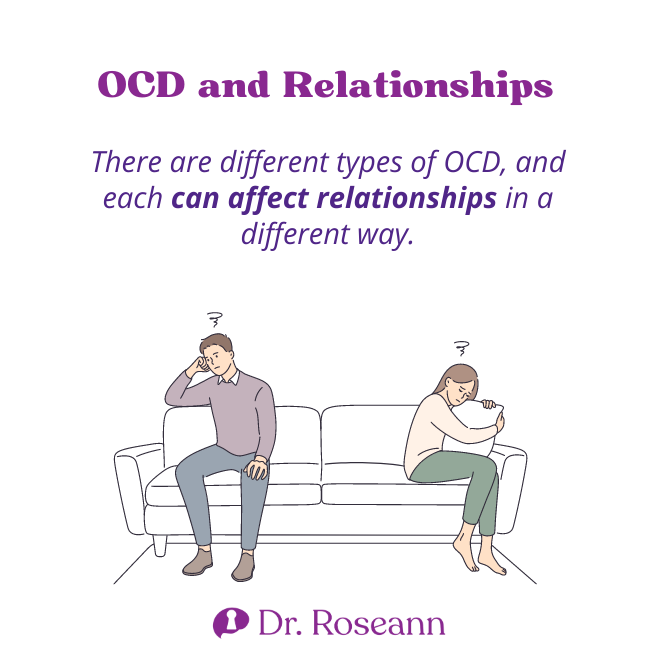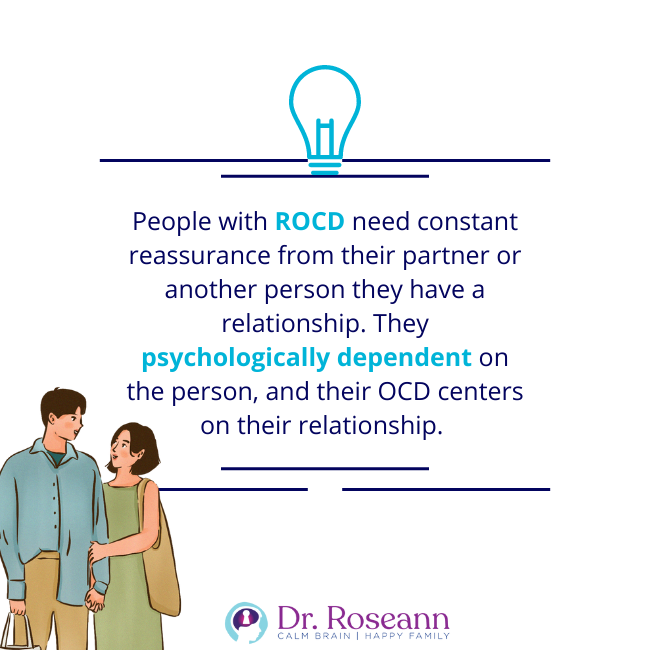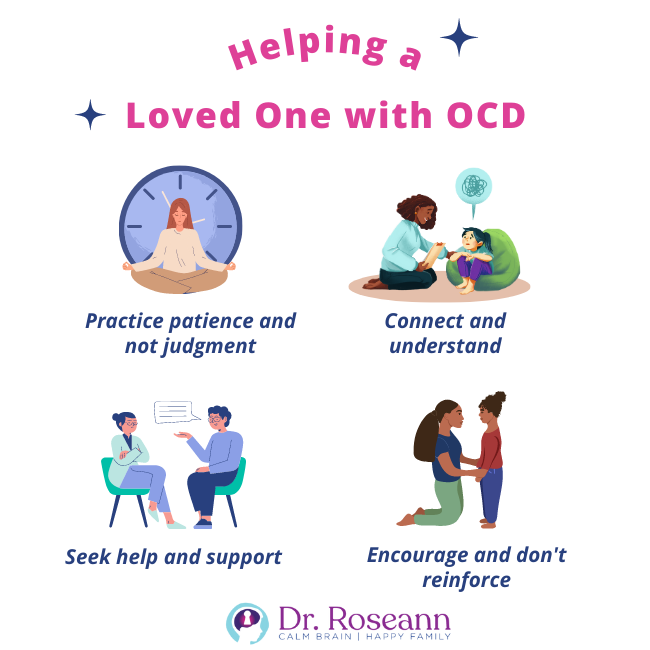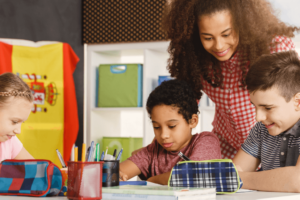OCD, or Obsessive-Compulsive Disorder, is characterized by irrational fears and thoughts, leading to compulsive behaviors. People with OCD use compulsions to reduce distress or eliminate obsessions. The behaviors result as a way to stop an irrational fear or “the bad from happening.” While all may have intrusive thoughts and compulsive behaviors from time to time, it doesn't mean it's OCD.
For anybody to be diagnosed with OCD, their obsessive compulsions must affect them such that they can no longer function normally in some way, shape, or form. These people tend to suffer from intrusive thoughts and compulsive behaviors for over an hour daily. There must be a significant impact on a child's or person's life.
On the surface, it is hard to “see” OCD because obsessional thinking can't be seen. There are many OCD myths, and people often think OCD only involves handwashing or other viewable compulsions, but that isn't the case. People also think OCD is similar to anxiety when it really isn't, and that is part of why most people with OCD just don't get proper OCD treatment.
Moreover, individuals with OCD often can be easily upset and display extremely avoidant behaviors because of their excessive sensitivity to the consequences of their actions. They need to perform certain mental or behavioral rituals so “the bad thing” doesn't happen. For these reasons, it's clear that OCD is a mental health disorder that can hinder the growth of healthy relationships.
OCD and Relationships

There are different types of OCD, and each can affect relationships in a different way. The most common types of OCD are contamination OCD, order or symmetry OCD, checking OCD, and harm OCD. Let's take harm OCD as an example of how it can directly affect relationships.
This type of OCD is characterized by intrusive thoughts that can lead to aggressive or violent behavior toward oneself or another. A child or kid with this OCD will develop compulsions to control violent thoughts. They really don't want to hurt themselves or others, but their brain fears they will.
While everybody else can have violent thoughts and shrug them off, those with harm OCD worry about it excessively. In their minds, these thoughts mean something or will somehow be enacted.
As a result, children and kids with harm OCD need constant assurance that their unwanted thoughts won't come true. They may ask, “Mommy, will I hurt the cat?” and mom inadvertently reinforced the OCD by saying, “Of course not!” That reassurance feeds the negative reinforcement. Furthermore, they feel that they need to do something to counter their worries. That's when they start performing rituals or compulsions to relieve their anxiety disorder.
After engaging in these ritualistic behaviors, they'll feel their anxiety toning down for a short period. But because of that, they will always perform these compulsive behaviors whenever the thought crosses their minds, creating an endless cycle of fear, obsessions, and uncertainty.
They may have this nagging fear that they will lose control and become vicious. So, they lock away sharp objects, review their every action, and avoid watching violent movies. They also compulsively pray, hang on to spiritual items, and constantly seek reassurance. Living with a loved one who constantly thinks they could harm you could strain relationships.
What is Relationship OCD?
Aside from the main types of OCD, there is a subtype or a form of OCD called relationship OCD (ROCD), which affects a person's life in different ways. It creates a negative impact on close relationships, mainly on people entering early adulthood. It causes relationship issues and may be one of the possible causes of failed past relationships among people with this mental illness.
As a result of their extreme relationship anxiety and an obsessive fear of abandonment, people with ROCD need constant reassurance from their partner or another person they have a relationship. They psychologically dependent on the person, and their OCD centers on their relationship.

As a result, their and their partner's every feeling and intention must be constantly validated, which can become tiresome and futile. They will need constant reassurance in person and often via text. The people they love are usually the focus of their anxieties and intrusive thoughts.
OCD, through doubt and anxiety, hijacks relationships. The other party may become frustrated and resentful if their affliction becomes the main point of the relationship. They may have no idea why this is happening if the person isn't diagnosed with OCD and therefore not getting proper treatment. Furthermore, if other OCDs or fears were present, like the fear of germs and unclean objects, they may also get in the way of expressing affection.
Research has shown that OCD can significantly affect romantic relationships. For example, one study states that relationship obsessive-compulsive disorder or ROCD symptoms are significantly associated with relationship dissatisfaction and depression over and above common OCD symptoms (Doron et al., 2016). Therefore, having a romantic partner with OCD can be very challenging for all parties involved.
Family Relationships and OCD
Aside from struggles with intimate relationships, their relationships with family and friends also get affected because they must always understand the need to carry out certain rituals or assume particular behaviors.
Constantly engaging in or understanding these behaviors and compulsions is oftentimes strenuous, tiresome, and demanding. Moreover, it isn't typical for a family to get proper OCD psychoeducation unless they have a highly trained ERP therapist like our center therapists.
Children and teens with OCD will also struggle to do their responsibilities at home, leading to the distress of other family members. As a result, they will feel depressed and anxious about their situation, which affects the condition of the people around them.
Furthermore, those with OCD may have low self-esteem because they always feel like a failure. They also go through constant feelings of shame, embarrassment, and insecurity. It results in decreased social interaction due to their dwindling interest in being around people.
This may lead to friends leaving them and family members letting them be alone in their obsessive thoughts. It will have a negative effect not just on their social life but may also make way for other mental health issues, including mood disorders.
Helping a Loved One with OCD

While OCD is a complicated mental health condition, the good news is that it can be treated. There are many ways to help and support a child or teen with OCD. A qualified licensed clinical psychologist or mental health provider can create a plan to give these kids a chance at a better quality of life and make them feel confident to start a successful relationship. Here are some ways to help ease their OCD symptoms.
1. Practice patience and not judgment
Be patient and supportive of a loved one suffering from OCD because being angry and judgmental will deter their recovery. Try not to make your emotions take over when a loved one asks you the same question or does something several times.
Know that it's difficult for OCD patients to shut down their repetitive behaviors, thoughts, and actions. Therefore, you should not minimize or dismiss their pain. Offer empathy instead of frustration and acknowledge their feelings but don't provide reassurance of their fears and instead reinforce coping skills.
2. Connect and understand
It's essential to connect with your child or teen with OCD and acknowledge the existence of the disorder. Communicate, educate, and show compassion while respecting the pain they may be going through.
Try to distinguish the behavioral symptoms of OCD and separate them from the person. Ask, “Is that your thinking, Amanda, or your OCD brain?” You are your child's best coach, and ERP therapy is your guide to supporting them so you can squash the OCD.
Always remember that your kids are doing what they do out of extreme anxiety or fear. OCD can isolate a family over time, leaving everyone feeling alone. It is scary for your child and you, as well as their siblings. Maintaining a sense of belonging with friends and family, including one's extended family, is imperative to curb any feelings of isolation.
3. Seek help and support
Support is necessary for anybody suffering from OCD, including their loved ones. Get professional help, practice meditation, or find stress-relieving outlets like exercises or hobbies. Your healthcare provider may recommend cognitive-behavioral therapy or exposure response prevention therapy.
Aside from finding a qualified therapist who can provide guidance, it will be helpful to talk with others who have experienced similar difficulties and learn how they dealt with them. You can start by joining our It's Gonna be OK! Facebook support group to get accurate information about OCD and resources to support your child in taking control of OCD.
4. Encourage and don't reinforce
Getting effective treatment for OCD is a significant and necessary step. First, seek OCD treatment options, and then encourage your child to comply and follow up with their treatment plan. Practicing exposure to OCD at home is paramount in extinguishing the behavior.
Know that people suffer from varying degrees of severity of OCD symptoms, and their progress will differ, but remain positive and know that OCD symptoms can lessen when you calm the brain and learn to talk back to OCD fears.
Always be patient and resist the urge to compare your kids to others. Remember not to reinforce or participate in your child's OCD compulsions, as doing so may hinder their recovery. Instead, your involvement in their rituals should be reduced gradually following their OCD treatment plan.
If you need help and guidance, we support families worldwide in our BrainBehaviorReset™ program. We combine the best of what science shows us to address the OCD brain and behavior and teach kids and families to take control of OCD.
Citations
Doron, G., Derby, D., Szepsenwol, O., Nahaloni, E., & Moulding, R. (2016). Relationship Obsessive–Compulsive Disorder: Interference, Symptoms, and Maladaptive Beliefs. Frontiers in Psychiatry, 7. https://doi.org/10.3389/fpsyt.2016.00058
Always remember… “Calm Brain, Happy Family™”
Are you looking for SOLUTIONS for your struggling child or teen?
Dr. Roseann and her team are all about solutions, so you are in the right place!
There are 3 ways to work with Dr. Roseann:
You can get her books for parents and professionals, including: It’s Gonna Be OK™: Proven Ways to Improve Your Child’s Mental Health, Teletherapy Toolkit™ and Brain Under Attack: A Resource For Parents and Caregivers of Children With PANS, PANDAS, and Autoimmune Encephalopathy.
If you are a business or organization that needs proactive guidance to support employee mental health or an organization looking for a brand representative, check out Dr. Roseann’s media page and professional speaking page to see how we can work together.
Dr. Roseann is a Children’s Mental Health Expert and Therapist who has been featured in/on hundreds of media outlets including, CBS, NBC, FOX News, PIX11 NYC, The New York Times, The Washington Post,, Business Insider, USA Today, CNET, Marth Stewart, and PARENTS. FORBES called her, “A thought leader in children’s mental health.”

She is the founder and director of The Global Institute of Children’s Mental Health and Dr. Roseann Capanna-Hodge. Dr. Roseann is a Board Certified Neurofeedback (BCN) Practitioner, a Board Member of the Northeast Region Biofeedback Society (NRBS), Certified Integrative Medicine Mental Health Provider (CMHIMP) and an Amen Clinic Certified Brain Health Coach. She is also a member of The International Lyme Disease and Associated Disease Society (ILADS), The American Psychological Association (APA), Anxiety and Depression Association of America (ADAA) National Association of School Psychologists (NASP), International OCD Foundation (IOCDF) International Society for Neurofeedback and Research (ISNR) and The Association of Applied Psychophysiology and Biofeedback (AAPB).
© Roseann-Capanna-Hodge, LLC 2023
Disclaimer: This article is not intended to give health advice and it is recommended to consult with a physician before beginning any new wellness regime. *The effectiveness of diagnosis and treatment vary by patient and condition. Dr. Roseann Capanna-Hodge, LLC does not guarantee certain results.













